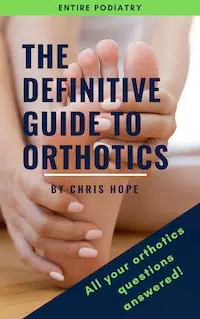Plantar fasciitis is one of the most common foot conditions we treat. Over the past 20 years, Entire Podiatry has helped thousands of people recover from heel pain and plantar fasciitis.
As there is no single ‘cause’ of plantar fasciitis, there is no single ‘quick fix’ for curing plantar fasciitis.
Everyone’s treatment will be different based on his or her individual needs.
Our podiatrists work with you to thoroughly assess your foot pain and your foot ‘biomechanics’ (this is the way that your foot functions) to figure out how and why your ligament is being overloaded. This allows the podiatrist to design the best, most effective and practical way to reduce the load through the ligament.
The podiatrist will provide you with immediate pain management strategies, as well as long-term plans to promote healing.
We will always ensure the treatment plan works for you e.g. a plan that compliments your lifestyle, ability and preferences.
Everyone’s treatment plan will be different, however common treatments include variations of:
- Footwear modification
- Orthotics
- Strapping tape
- Exercises- Stretching/strengthening and massage
- Braces/compression socks
- Activity modification
- Non-conservative treatment options
Footwear modification
Our shoes play a vital role in supporting and cushioning our feet. Therefore it’s no surprise that incorrect footwear is one of the leading causes of plantar fasciitis. Your podiatrist will work with you to discuss what shoes are appropriate for you and your foot type, whilst paying attention to your preferences and personal requirements. We recommend you bring your shoes to your consult so the podiatrist can assess them.
Orthotics
A pair of orthotics is one of the most effective means of providing relief from plantar fasciitis pain. Orthotics also facilitate healing of the ligament. Foot orthotics are customised foot innersoles which support the foot and reduce strain through the plantar fascia. Orthotics also provide cushioning and spread the pressure out evenly across your foot.
In order to make these orthotic devices, the podiatrist will perform a thorough ‘biomechanical assessment’. This assessment will reveal the potential causes of your plantar fasciitis and the orthotics will be designed in such a way to address and correct this.
E.g. plantar fasciitis is often seen in those who over-pronate (link to the ‘causes’ section). A custom orthotic would reduce the amount that your foot ‘rolls in’ in order to reduce the strain and stretch from the ligament.
Strapping tape
The podiatrist is able to strap your foot using sports tape in a way that shortens and reduces strain through the ligament. We often see people limping into the clinic room then walking out after plantar fasciitis strapping. The correct strapping technique is able to provide both immediate pain relief whilst also holding the ligament into a better position to facilitate healing. Your podiatrist is able to demonstrate how to perform this strapping at home.
Exercises- Stretching/strengthening and massage
Much of that terrible ‘first steps in the morning pain’ can be reduced with simple exercises. Whenever we are off our feet the plantar fascia contracts and shortens and the body tries to ‘repair’ itself. The first time you stand up in the morning the ligament is abruptly ‘awakened’ and stretched past its limits. Not only is this causing more damage, it is a horrible pain. By taking some time to ‘warm up’ your foot after periods of inactivity, the ligament is able to better tolerate the force of your body weight through your feet and the risk of further damage is reduced.
It is important that your podiatrist assess your foot thoroughly to advise if this treatment is correct for you.
If muscular tightness is deemed to be a contributing factor to the development of your plantar fasciitis, your podiatrist can recommend some stretches and strengthening exercises to assist with this.
Our podiatrists are also able to perform soft tissue releases, similar to a deep tissue massage on problems areas, specifically calves.
Activity modification
It is important for your podiatrist to understand if your day-to-day activities and exercise levels are causing an overload of your plantar fascia. The podiatrist can work with you to develop ways to modify your training load and even give some hints about simple ways to modify your daily routine which can make a big difference in reducing the load your plantar fascia takes.
Braces/compression socks
Some people receive benefit from the use of a night splint. This splint is worn whilst sleeping and holds the foot in a stretched position to reduce the contraction that occurs in the soft tissue over night. This can be particularly helpful for those who suffer from pain in the first few steps after waking.
Compression socks or ‘plantar fasciitis socks’ can also be helpful in the treatment of plantar fasciitis. These are a tightly fitted sock which keeps the foot stable and the ligament stretched to reduce the contracture that can occur over night.
Compression socks achieve a similar goal to strapping tape but have the benefit of being worn comfortably while you sleep or under regular socks without leaving the sticky residue from traditional taping.
Non-conservative treatment options
At Entire podiatry we find that we are able to effectively treat the vast majority of patients using a personalised ‘conservative’ treatment plan. However there are a small number of people that do not respond to the typical conservative treatment approach.
Should there be no improvement then alternate options including immobilisation through a moon boot, cortisone steroid injections or surgery may be required.
Does Medicare cover plantar fasciitis?
You may be eligible for a Medicare rebate if you are referred by your doctor through a GP Management Plan (GPMP) under a Team Care Arrangement (TCA).
If you are eligible for the Medicare rebate then there will be no gap for the consultation.
In order to receive a Medicare rebate for podiatry services, you need to obtain a valid referral for podiatry from your doctor. This is generally put in place if your GP identifies that you have a chronic medical condition or complex care needs, in which case you may benefit from having one of these plans developed.
The Medicare rebate applies only to the consultation fee, and any additional services incur an out-of-pocket expense. For example, footwear modifications, orthotics and minor surgical procedures that may be recommended by your Podiatrist are not covered by Medicare. These fees may be covered by your private health fund if you are covered for podiatry services.




